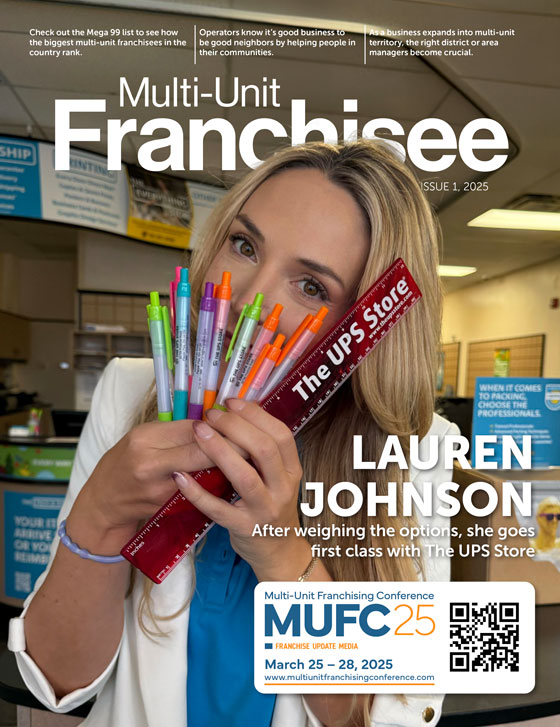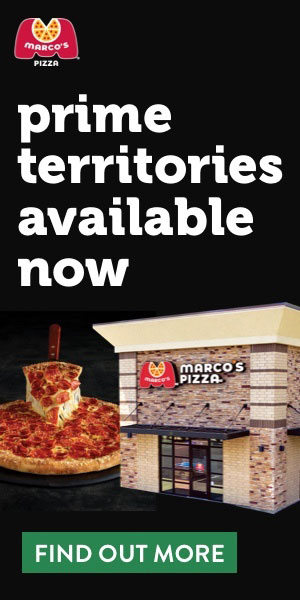Delayed Gratification: Operator learns from his father's steady approach

Name: Jerome Johnson
Title: Multi-Unit Franchisee
Company: John Cove Management and Jbar Inc.
No. of units: 4 Sonic Drive-In, 10 Dunkin', 4 Baskin-Robbins, 1 Jersey Mike's Subs
Age: 43
Family: Wife Candice and 3 children ages 7, 5, and 2
Years in franchising: 21
Years in current position: 21
Conventional wisdom said Jerome Johnson Jr. should've continued with school and then looked for a job after earning his college degree. He is the son of a military family that placed a high value on education. Just 20 years old at the time, he had little money of his own and no knowledge of running a business. However, his father recognized his strong entrepreneurial spirit and encouraged him to pursue his dream of business ownership.
During spring break of his sophomore year at Virginia Union University, Johnson and his father traveled to Dunkin' headquarters in Boston. Company officials said there was an opportunity to open a location within the Pentagon in Washington, D.C. Perhaps it was a sign as Jerome Johnson Sr. worked in the Pentagon for several years while in the Army. The two opened their first Dunkin' franchise in the Pentagon in 2003, two years after terrorists attacked on Sept. 11.
Johnson's father fronted the franchise costs, served as the group's CEO, and joined several committees within the system. More importantly, he was a strong influence in showing his son how to successfully run a business through dedication and hard work. Johnson said his early contribution to the business was through sweat equity by opening and closing the stores and not missing a day of work for years.
One of the most important lessons the father taught his son was about delayed gratification. Johnson paid himself the bare minimum and lived with his parents for three years. The partners reinvested their profits back into the business as they always focused on the bigger goal of scaling.
"I lost a lot of friends early in my career," Johnson says. "They had freedom to go out and do what they wanted each night while I had to get up and go to work and run a business. But I don't regret it at all. Now if I ask people if they want to get together on a Wednesday, most of them are not able to do it. I'm glad I dedicated my life to the business, and I now have more freedom."
From 2003 to 2009, the Johnsons opened nine Dunkin' units and four Baskin-Robbins locations inside government buildings, including the Pentagon, the Defense Intelligence Agency's headquarters, and military bases. Approximately 10 years ago, Jerome met a rep from Sonic at Franchise Update Media's Multi-Unit Franchising Conference and expanded his portfolio to include the fast-food restaurant brand.
Changes to the office work environment and customer traffic forced Johnson to alter his franchise territories from government buildings to traditional restaurant locations. As he navigates this change and maps out his businesses' growth, he'll continue to do it through hard work with an eye on the end result.
"A lot of people get into franchising and believe it is a get-rich-quick type of business. That is not reality," Johnson says. "There will be a lot of hard times in the first few years. It takes time to pay off loans and for the business to show a profit. People need to be patient, work hard, and remember why they got into the business and keep pushing forward."
PERSONAL
First job: When I was 16, I got my first job at Champions Go-Kart Track in Woodbridge, Virginia. Years later, we built a Dunkin'/Baskin-Robbins on the same land where the track once stood. Talk about coming full circle.
Formative influences/events: Attending Virginia Union University in Richmond, Virginia, an HBCU. College is where my entrepreneurial spirit really took shape. I sold everything from calling cards to mixtapes on campus. My father took notice of my drive, and we started looking into franchising.
Key accomplishments: Making my father proud. In 2016, I branched out on my own to open a Sonic Drive-In restaurant. My father visited the store every week and brought a group of friends each time to show them what his son had accomplished. I have never seen him so proud.
Biggest current challenge: Government locations have always been our bread and butter. However, since Covid, a large part of the workforce continues to work from home. This has caused us to focus on traditional locations, which is why we acquired a network in Charlottesville, Virginia.
Next big goal: In 2025, our goal is to remodel three locations and open our fifth Sonic Drive-In in Dumfries, Virginia. We are also looking to identify two locations for expansion.
First turning point in your career: Although it wasn't the first, the biggest turning point in my career was attending my first Multi-Unit Franchising Conference in Las Vegas in 2015. That was the first time I was surrounded by fellow franchisees from all segments. I met several people who had more than 20 units and some had more than 100. I never imagined that was possible, but being in that room, it quickly became a reality.
Best business decision: Listening to my college professor and opening my first Dunkin' in the Pentagon. I remember being conflicted about leaving school, but my professor told me that I could always come back to school, but this opportunity may not ever come again. I took his advice and, a few months later, enrolled in Dunkin' Donuts University. I later went back and earned my degree from the University of Phoenix.
Hardest lesson learned: I gave an independent general contractor a check for $120,000 to build a Sonic, and a few weeks later, he unfortunately died. I never got the money back, and as a result, I work with large companies now.
Work week: All day, every day. Things have gotten easier as I have brought on area managers for each brand and started a chain-of-command system.
Exercise/workout: I'm big into biking, and it is something I try to do at least three times a week. My biggest accomplishment was completing my first 100-mile ride in 2021.
Best advice you ever got: My dad always preached delayed gratification, saying, "Work hard now, so you can play hard later." I live my life by that rule.
What's your passion in business? Motivating and inspiring my employees to be the best versions of themselves. I love the fact that I have managers today who started off on the coffee line, but with a little motivation, they were able to rise to the top. Sometimes people just need to know someone believes in them.
How do you balance life and work? I preach work-life balance to my crew all the time, particularly my managers. Without it, you will find yourself burned out. The best thing that has worked for me has been setting clear boundaries and prioritizing daily tasks.
Guilty pleasure: Milk chocolate.
Favorite book: Atomic Habits by James Clear. This book really helped me to be more task oriented.
Favorite movie: "Black Hawk Down." I love war movies. I used to watch them with my dad when I was a teen.
What do most people not know about you? I lived in Germany two separate times when I was a kid as both my parents served in the Army. My dad is a retired lieutenant colonel, and my mom is a retired major. We moved every two to three years. I think that's why I can adapt to different environments and make friends so easily.
Pet peeve: Time is everything to me after being raised in a military household. Being late really bothers me.
What did you want to be when you grew up? I thought I would be a salesman when I grew up. I loved going door to door and selling popcorn when I was in the Boy Scouts.
Last vacation: Martha's Vineyard in August for the African-American Film Festival. It was special for my family and me to attend.
Person you'd most like to have lunch with: I follow the entrepreneur and author John Hope Bryant on Instagram, and he's always talking about cash flow and investing. That is the type of person I would like to have as a mentor as I grow because I believe it would indeed bear fruit. As they say in "Hamilton," "to be in the room where it happens."
MANAGEMENT
Business philosophy: Our vision is to make our customers' visits the best part of their day through quick and friendly service.
Management method or style: Fair. I'm not a micromanager, and I try to understand everyone's individual situation. People often experience things in their personal lives that we don't know about as employers. Sometimes their performance suffers, and employers want to let them go without knowing their situation.
Greatest challenge: Pivoting in a changing market. With so many people working from home, it has had a major impact on our business model centered around office space. We have pivoted to traditional brand sites and closed two of our nontraditional restaurants. It was a difficult change, but it was the right thing to do.
How do others describe you? As a motivator. I often have people tell me I am good at motivating them, which excites me because that is exactly what I'm trying to do.
Have you ever been in a mentor-mentee relationship? What did you learn? I started out in business with my father, Jerome Sr. He is my hero. He taught me about delayed gratification. It is important to reinvest back into the business and continue to grow it. We didn't just want to have one location. Instead, we wanted the multiple units we have today.
One thing you're looking to do better: Controlling our food and labor costs must continue to be a prime focus. If we can reduce both categories by even 1%, the bottom line would increase by $400,000. It has been a challenge as costs continue to rise and margins continue to shrink.
How you give your team room to innovate and experiment: I trust my managers and allow them to modify their stores to ensure productivity and efficiency.
How close are you to operations? I have three great operations managers, and they directly report back to me. I still like to check on the stores myself from time to time and try to have onsite touchpoints multiple times a month.
What are the two most important things you rely on from your franchisor? Brand awareness/marketing and operations systems. I believe this is why people decide to run a franchise in the first place. They sign up for a proven and known system.
What you need from vendors: Lower prices would be nice, but I'm sure they are also fighting to control costs.
Have you changed your marketing strategy in response to the economy? How? Yes. We took a grassroots approach and did our own local marketing. This allowed us to have a close relationship with the community and do things like spirit night for local schools and organizations, giving them a portion of the proceeds. We also set up and give away swag at local fairs and events.
How is social media affecting your business? It's increasing brand awareness with every view. The more a person sees a brand or product, the more likely they are to visit.
In what ways are you using technology (like AI) to manage your business? AI allows businesses to do so many things now. ChatGPT can help you write or update your employee handbook or business plan. AI can also help you respond to applicants. It has been a great addition to our business.
How do you hire and fire? Define the role and expectations and document performance issues.
How do you train and retain? Create a family team culture and make sure every team member has the proper tools to alleviate any concerns.
How do you deal with problem employees? We document any problems and work hard to get them back on track by retraining them and outlining clear expectations.
Fastest way into your doghouse: Have an issue being on time.
BOTTOM LINE
Annual revenue: Approximately $20 million.
2025 goals: Open a Sonic location in Dumfries, Virginia, and remodel three stores.
Growth meter: How do you measure your growth? We track our year-over-year sales and transaction counts.
Vision meter: Where do you want to be in five years? 10 years? I'm living my dream now, but I'm still young and have a new goal of $50 million in annual revenue.
Do you have brands in different segments? Why/why not? Not at the moment, but my wife and I have looked into getting into the beauty industry.
How is the economy in your region(s) affecting you, your employees, your customers? Sales and customer counts are down as people are holding their wallets closer with the rising costs. There are also a lot of people working from home, which has impacted our locations in federal buildings, like the Pentagon and Defense Intelligence Agency.
Are you experiencing economic growth in your market? Yes and no. There are opportunities for growth, but construction, supply chain, and funding constraints have made it challenging to stand up units in a timely fashion.
How do changes in the economy affect the way you do business? The economy has greatly impacted our menu prices. In the past, we would raise prices maybe once or twice a year. We are now changing the menu board at least four times a year to keep up with the rising cost of goods. Labor costs have gone up with the increases in minimum wage, which also impacts our menu prices.
How do you forecast for your business? We review the last two years of sales and transactions. We also look at trends over the previous three months.
What are the best sources for capital expansion? Instead of taking a large profit in the early days of our business, we reinvested our earnings back into the business. That way, we limited our debt.
Experience with private equity, local banks, national banks, other institutions? Why/why not? Local banks have been good since they are in tune with the community. However, for those who are looking to find a bank that understands the franchise model, I highly suggest attending the annual Restaurant Finance & Development Conference in Las Vegas. There are more than 100 private equity groups, national banks, and other institutions all looking to finance a franchise deal.
What are you doing to take care of your employees? Through employee recognition, rewards, and team-building events. We celebrate birthdays, dress up for holidays, and occasionally hold family meals. We feel this helps boost morale and motivation.
How are you handling rising employee costs (payroll, minimum wage, healthcare, etc.)? We are pushing digital and third-party sales as well as installing kiosks in our stores to reduce the number of staff per shift.
What laws and regulations are affecting your business, and how are you dealing with them? Labor laws are really having an impact on our business as minimum wage continues to increase. We are pushing third-party deliveries and adding kiosk ordering stations in our restaurants.
How do you reward/recognize top-performing employees? We give our managers and shift leads a quarterly bonus based on performance. Our crew has opportunities to receive gift cards and be recognized in our monthly newsletter. Top-performing employees are usually given more tasks and elevated to crew leads.
What kind of exit strategy do you have in place? Exit strategy. What's that? I'm building this to create generational financial freedom. I have three kids, and I hope they will want to carry the torch and continue our legacy.
Share this Feature
Recommended Reading:
| ADVERTISE | SPONSORED CONTENT |
FRANCHISE TOPICS
- Multi-Unit Franchising
- Get Started in Franchising
- Franchise Growth
- Franchise Operations
- Open New Units
- Franchise Leadership
- Franchise Marketing
- Technology
- Franchise Law
- Franchise Awards
- Franchise Rankings
- Franchise Trends
- Franchise Development
- Featured Franchise Stories
FEATURED IN

Multi-Unit Franchisee Magazine: Issue 1, 2025
| ADVERTISE | SPONSORED CONTENT |

$211,400





 The multi-unit franchise opportunities listed above are not related to or endorsed by Multi-Unit Franchisee or Franchise Update Media Group. We are not engaged in, supporting, or endorsing any specific franchise, business opportunity, company or individual. No statement in this site is to be construed as a recommendation. We encourage prospective franchise buyers to perform extensive due diligence when considering a franchise opportunity.
The multi-unit franchise opportunities listed above are not related to or endorsed by Multi-Unit Franchisee or Franchise Update Media Group. We are not engaged in, supporting, or endorsing any specific franchise, business opportunity, company or individual. No statement in this site is to be construed as a recommendation. We encourage prospective franchise buyers to perform extensive due diligence when considering a franchise opportunity.